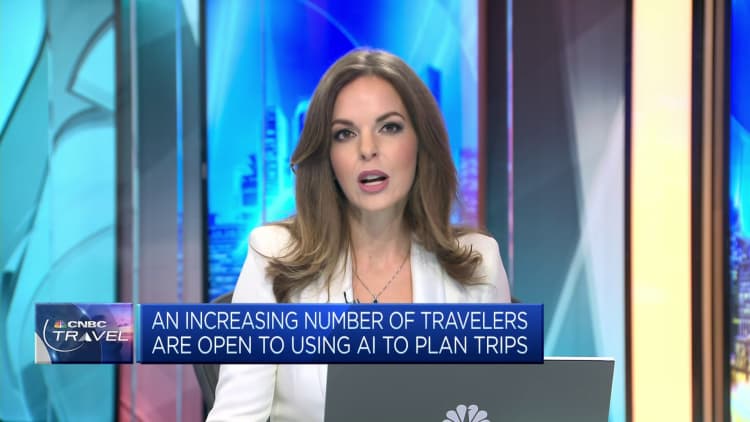According to a global survey of more than 5,700 travelers commissioned by Expedia Group, the average traveler spends more than five hours researching a trip and reviews 141 pages of content — for Americans, it’s a whopping 277 pages.
Enter generative artificial intelligence — a technology set to simplify that process, and allow companies to better tailor recommendations to travelers’ specific interests.
What could that look like? The hope is that AI will not only plan itineraries, but communicate with hotels, draft travel budgets, even function as a personal travel assistant — and in the process fundamentally alter the way companies approach travelers.
A typical home search on Airbnb, for example, produces results that don’t take past searches into account. You may have a decade of booking upscale, contemporary homes under your belt, but you’ll likely still be offered rustic, salt-of-the-earth rentals if they match the filters you’ve set.
But that could soon change.
During an earnings call in May, CEO Brian Chesky discussed how AI could alter Airbnb’s approach. He said: “Instead of asking you questions like: ‘Where are you going, and when are you going?’ I want us to build a robust profile about you, learn more about you and ask you two bigger and more fundamental questions: Who are you, and what do you want?”

While AI that provides the ever-elusive goal of “personalization at scale” isn’t here yet, it’s the ability to search massive amounts of data, respond to questions asked using natural language and “remember” past questions to build on a conversation — the way humans do — that has the travel industry (and many others) sold.
Travel companies using A.I.
In a survey conducted in April by the market research firm National Research Group, 61% of respondents said they’re open to using conversational AI to plan trips — but only 6% said they actually had.
Furthermore, more than half of respondents (51%) said that they didn’t trust the tech to protect their personal data, while 33% said they feared it may provide inaccurate results.
Yet while travelers are still debating the safety and merits of using AI for trip planning, many major travel companies are already diving headfirst into the technology.
Just look at the names on this list.
- In February, the Singapore-based travel company Trip.com launched TripGen, an in-app chatbot powered by OpenAI, the maker of ChatGPT.
- In March, Expedia and Kayak were among the first batch of plugins rolled out by ChatGPT.
- In April, Expedia announced a beta launch of a AI chatbot from ChatGPT.
- In May, the Europe-based travel booking company eDreams Odigeo joined Google Cloud’s AI “Trusted Testers Program,” and Airbnb announced plans to build GPT-4, OpenAI’s newest large language model, into its interface.
A summer explosion of travel A.I.
Then the summer of 2023 saw a burst of AI travel tech announcements.
In June:
- Amazon Web Services announced an investment of $100 million into a program to help companies use generative AI, with RyanAir and Lonely Planet as two of the first four companies involved.
- Booking.com rolled out an in-app “Trip Planner” AI chatbot to select U.S. members of its Genius loyalty program.
- Priceline launched a platform called Trip Intelligence, led by a Google-backed generative AI chatbot named “Penny.”
HomeToGo’s new “AI Mode” allows travelers to find vacation rental homes using natural language requests.
Source: HomeToGo
In July:
- Tripadvisor launched a web-based, AI-powered travel itinerary maker called Trips.
- Trip.com released an updated chatbot called TripGenie, which responds to text and voice requests, shows images and maps, and provides links for bookings.
- The holiday home rental company HomeToGo beta launched an in-app AI search function called “AI Mode” for users in the United States and United Kingdom.
Now, more travel companies have ChatGPT plugins, including GetYourGuide, Klook, Turo and Etihad Airways. And a slew of AI-powered trip planners — from Roam Around (for general travel), AdventureGenie (for recreational vehicles), Curiosio (for road trips) — added more options to the growing AI travel planning market.
Beyond travel planning
Travel planning is the most visible use of AI in the travel industry right now, but companies are already planning new features.
Trip.com’s Senior Product Director Amy Wei said the company is considering developing a virtual travel guide for its latest AI product, TripGenie.
“It can help provide information, such as an introduction to historical buildings and objects in a museum,” she told CNBC. “The vision is to create a digital travel companion that can understand and converse with the traveler and provide assistance at every step of the journey.”
The travel news site Skift points out AI may be used to predict flight delays and help travel companies respond to negative online reviews.
The company estimates chatbots could bring $1.9 billion in value to the travel industry — by allowing companies to operate with leaner customer service staff, freeing up time for humans to focus on complex issues. Chatbots needn’t be hired or trained, can speak multiple languages, and “have no learning curve,” as Skift points out in a report titled “Generative AI’s Impact on Travel.”
Overall, Skift’s report predicts generative AI could be a $28.5 billion opportunity for the travel industry, an estimate that if the tools are used to “their full potential … will look conservative in hindsight.”

